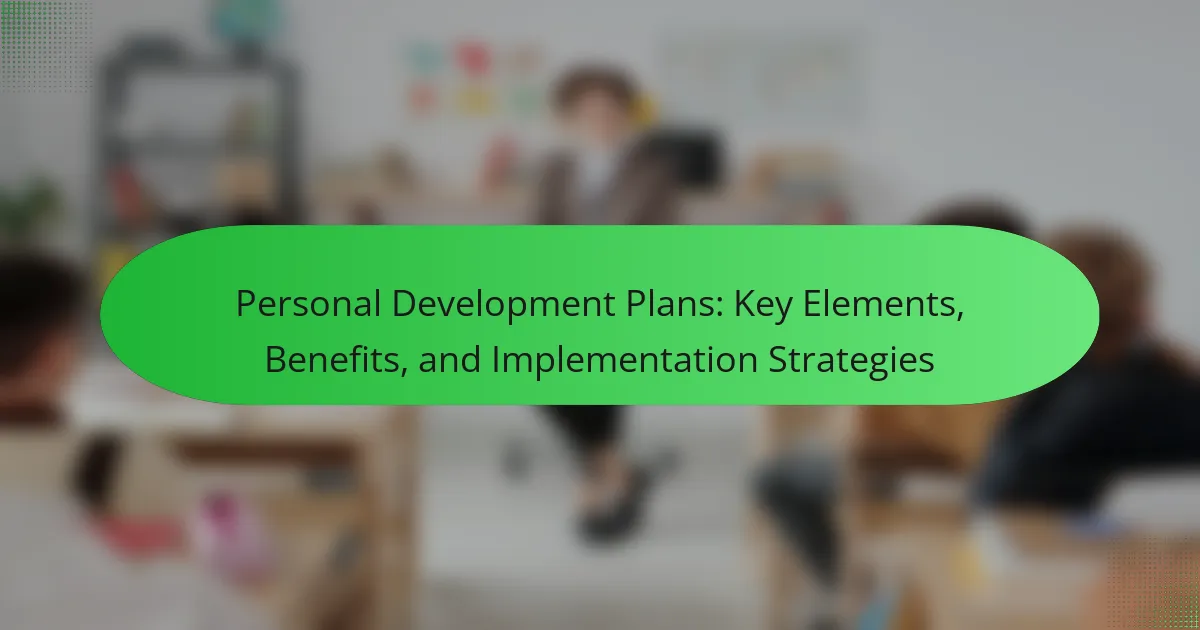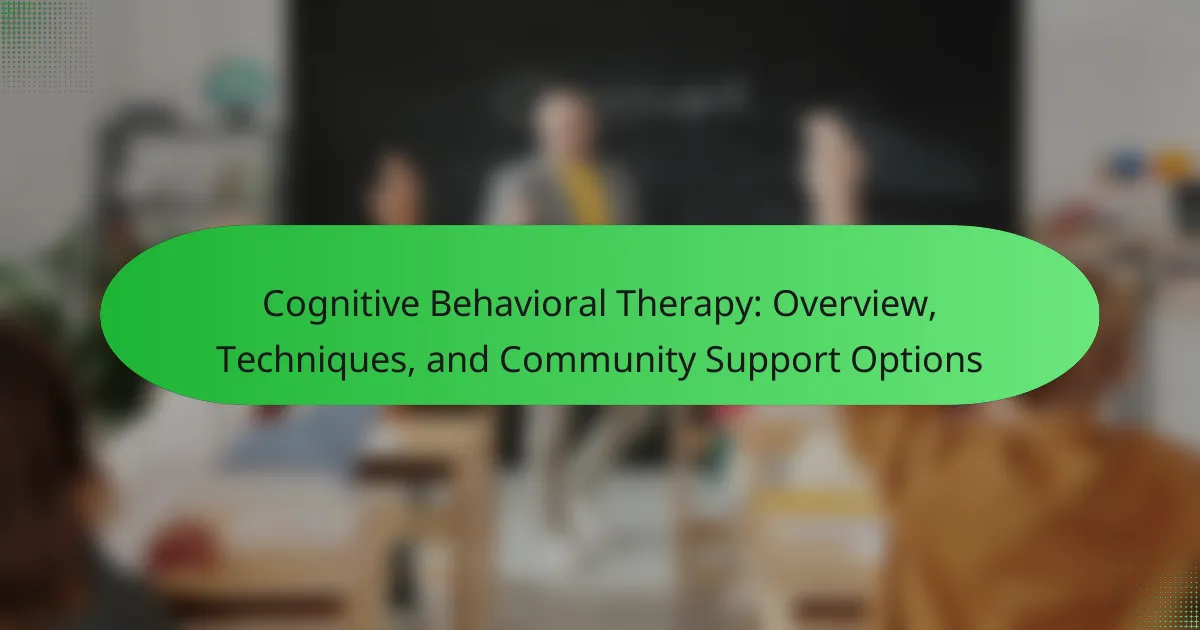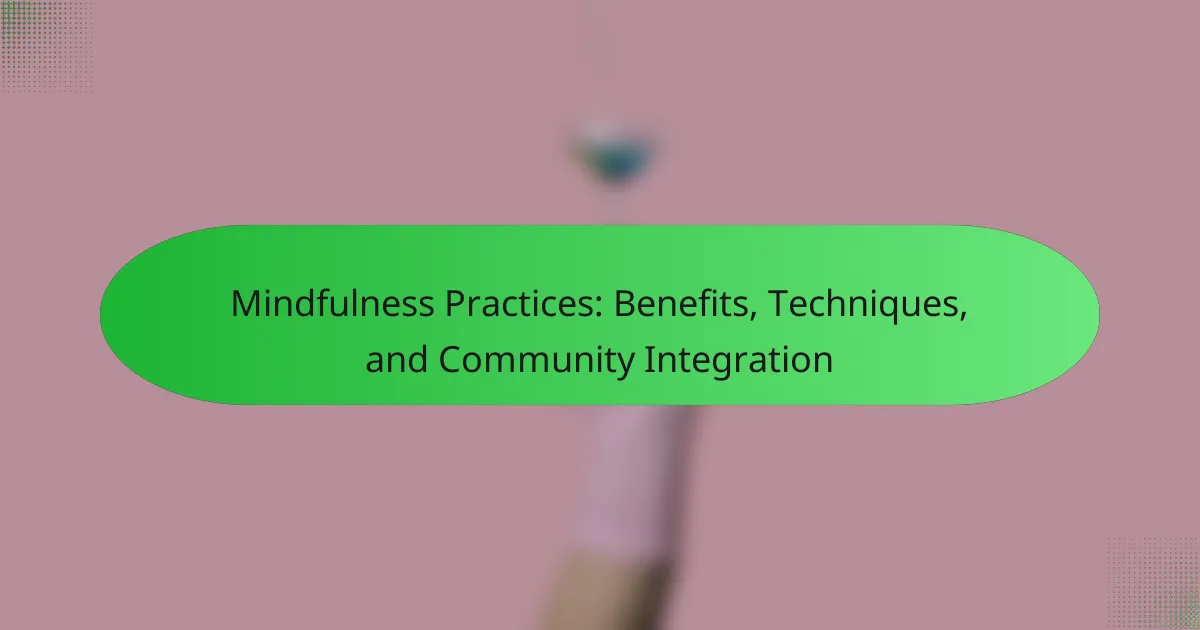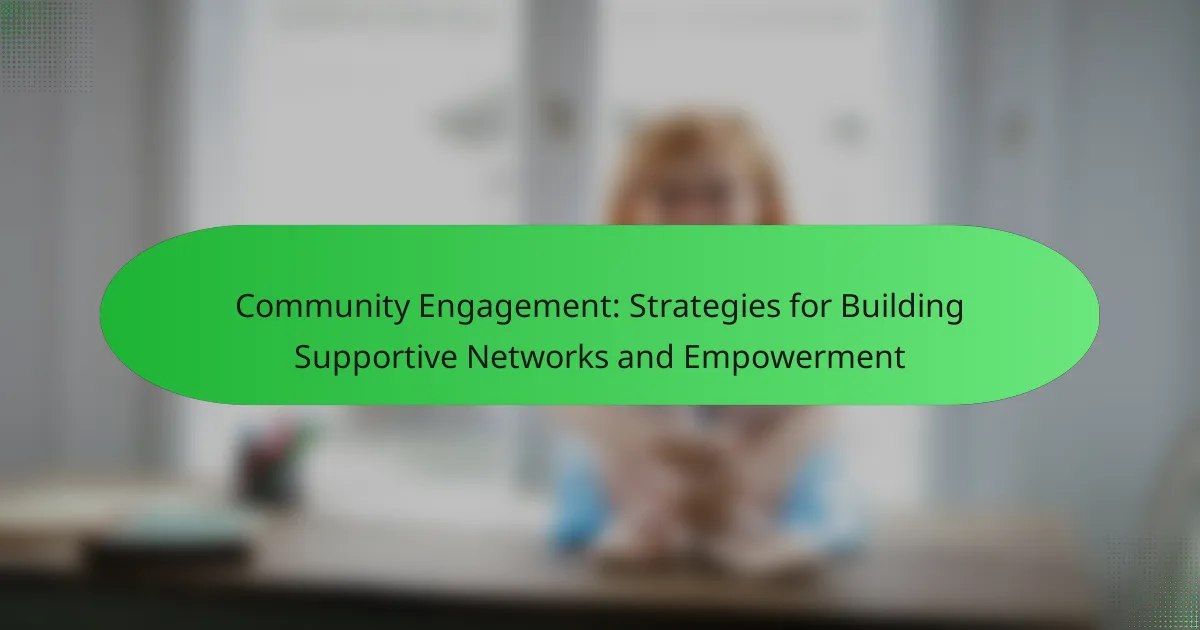Positive psychology enhances well-being and personal growth by focusing on strengths, fostering resilience, and improving life satisfaction. This article explores its core principles, practical applications in various settings, unique practices like mindfulness and gratitude, and strategies for community engagement. Additionally, it addresses challenges in implementation and highlights cultural nuances that shape positive psychology’s effectiveness.

What are the foundational concepts of Positive Psychology?
Positive psychology emphasizes well-being and personal growth through core concepts like positive emotions, engagement, relationships, meaning, and accomplishment. These principles guide applications in therapy, education, and community initiatives, fostering resilience and enhancing life satisfaction. By focusing on strengths rather than weaknesses, positive psychology promotes a proactive approach to mental health.
How does Positive Psychology differ from traditional psychology?
Positive psychology focuses on strengths and well-being, while traditional psychology often addresses mental illness and dysfunction. Positive psychology emphasizes positive experiences, traits, and institutions, promoting flourishing and resilience. Traditional psychology tends to prioritize diagnosis and treatment of psychological disorders. This distinction highlights positive psychology’s unique attribute of fostering personal growth and happiness, contrasting with the more problem-focused approach of traditional psychology.
Why is well-being a central focus in Positive Psychology?
Well-being is central to Positive Psychology because it emphasizes the enhancement of individual and collective happiness. This field focuses on strengths, virtues, and factors that contribute to a fulfilling life. Research indicates that well-being improves mental health, fosters resilience, and enhances social connections. Positive Psychology aims to cultivate positive experiences and promote flourishing, making well-being a foundational element of its principles.
Which key theories underpin Positive Psychology?
Positive psychology is grounded in several key theories. These include the broaden-and-build theory, which suggests positive emotions expand cognitive resources, and the PERMA model, emphasizing five essential elements: Positive Emotion, Engagement, Relationships, Meaning, and Accomplishment. Additionally, self-determination theory focuses on intrinsic motivation, while flow theory highlights optimal experiences in activities. Each theory contributes uniquely to understanding well-being and human flourishing.
What role do strengths play in Positive Psychology?
Strengths play a crucial role in Positive Psychology by enhancing well-being and fostering personal growth. They help individuals identify and leverage their unique capabilities, leading to increased life satisfaction and resilience. Research shows that focusing on strengths can improve mental health outcomes, promote positive relationships, and encourage community engagement. Emphasizing strengths rather than weaknesses allows individuals to cultivate a more optimistic mindset, ultimately contributing to a flourishing life.

How can Positive Psychology be applied in various settings?
Positive psychology can be applied in various settings such as education, workplace, healthcare, and community programs. In education, it enhances student engagement and resilience through strengths-based approaches. In the workplace, it fosters employee well-being and productivity by promoting positive relationships and recognition. Healthcare settings utilize positive psychology to improve patient outcomes and support mental health through interventions that focus on strengths and optimism. Community programs leverage these principles to build social connections and enhance community resilience, ultimately improving quality of life.
What are effective strategies for implementing Positive Psychology in education?
Effective strategies for implementing Positive Psychology in education include fostering a growth mindset, integrating mindfulness practices, and promoting positive relationships among students and teachers. These approaches enhance student well-being and academic performance.
1. Encourage a growth mindset by teaching students that abilities can improve through effort and perseverance.
2. Incorporate mindfulness practices, such as meditation or breathing exercises, to help students manage stress and enhance focus.
3. Promote positive relationships by creating a supportive classroom environment that values collaboration and respect.
4. Use strengths-based approaches, allowing students to identify and leverage their unique strengths in learning activities.
5. Implement gratitude exercises, encouraging students to reflect on positive experiences to boost overall happiness and engagement.
6. Involve the community by creating partnerships with local organizations that support mental health and well-being initiatives in schools.
How does Positive Psychology enhance workplace culture and productivity?
Positive psychology enhances workplace culture and productivity by fostering a positive environment that boosts employee morale. It promotes engagement, resilience, and collaboration among team members. Research indicates that organizations implementing positive psychology principles report higher job satisfaction and lower turnover rates. For example, a study found that companies with a positive culture saw a 31% increase in productivity. By focusing on strengths and well-being, positive psychology creates a thriving workplace that encourages innovation and growth.
What are the benefits of using Positive Psychology in therapeutic practices?
Using Positive Psychology in therapeutic practices enhances well-being, fosters resilience, and promotes personal growth. It shifts focus from pathology to strengths, encouraging clients to cultivate positive emotions and meaningful connections. Research shows that interventions based on Positive Psychology can lead to increased life satisfaction and reduced symptoms of depression. Additionally, community engagement through Positive Psychology practices strengthens social bonds and supports collective mental health.
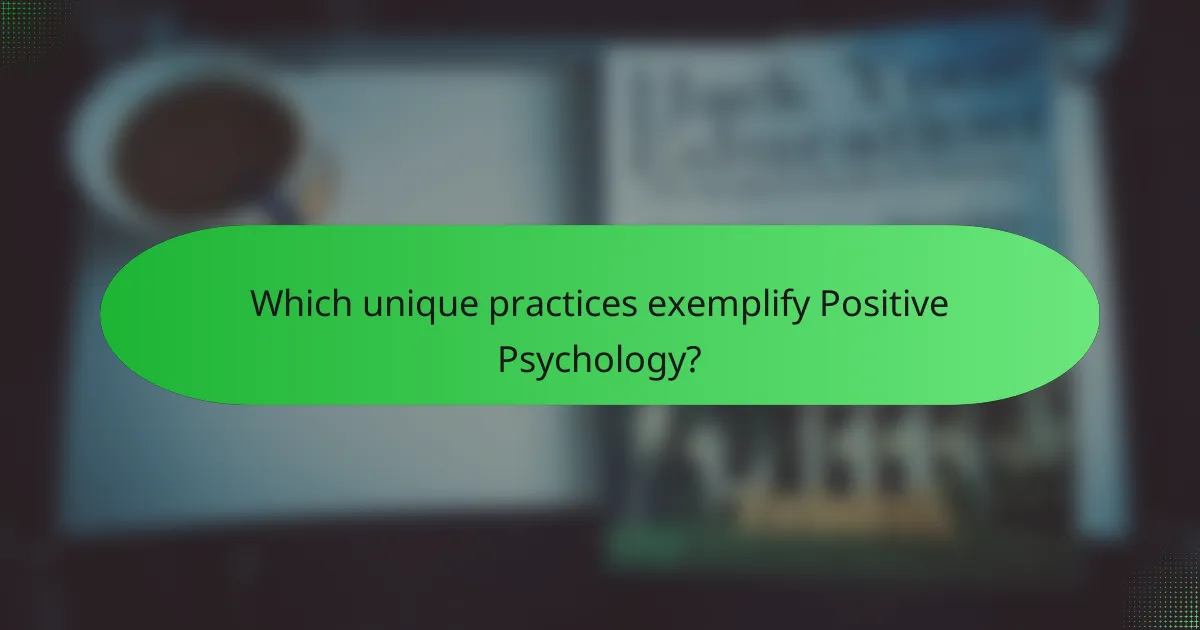
Which unique practices exemplify Positive Psychology?
Positive psychology exemplifies unique practices such as mindfulness, gratitude exercises, and strengths-based assessments. These practices enhance well-being and foster resilience. Mindfulness promotes present-moment awareness, while gratitude exercises encourage appreciation, improving emotional health. Strengths-based assessments identify individual talents, guiding personal development and community engagement.
How do gratitude exercises contribute to well-being?
Gratitude exercises significantly enhance well-being by fostering positive emotions and reducing stress. Engaging in these practices can lead to increased life satisfaction, improved relationships, and greater resilience. Research indicates that individuals who regularly express gratitude experience lower levels of depression and anxiety. Additionally, gratitude exercises promote a sense of community and connection, which are essential components of positive psychology. Studies show that maintaining a gratitude journal can result in a 25% increase in overall happiness.
What is the impact of mindfulness on mental health?
Mindfulness positively impacts mental health by reducing stress, anxiety, and depression. It enhances emotional regulation and promotes overall well-being. Research indicates that regular mindfulness practice can lead to structural changes in the brain, improving areas related to attention and self-awareness. Additionally, mindfulness fosters a sense of community and connectedness, vital for positive psychology. Engaging in mindfulness within group settings can amplify its benefits, encouraging social support and collective resilience.
How can positive interventions improve life satisfaction?
Positive interventions significantly enhance life satisfaction by fostering resilience, gratitude, and social connections. These practices, rooted in positive psychology, encourage individuals to focus on strengths and positive experiences. For instance, expressing gratitude has been linked to improved emotional well-being and stronger relationships. Engaging in community activities can also provide a sense of belonging, further boosting life satisfaction. As a result, implementing positive interventions cultivates a more fulfilling life.
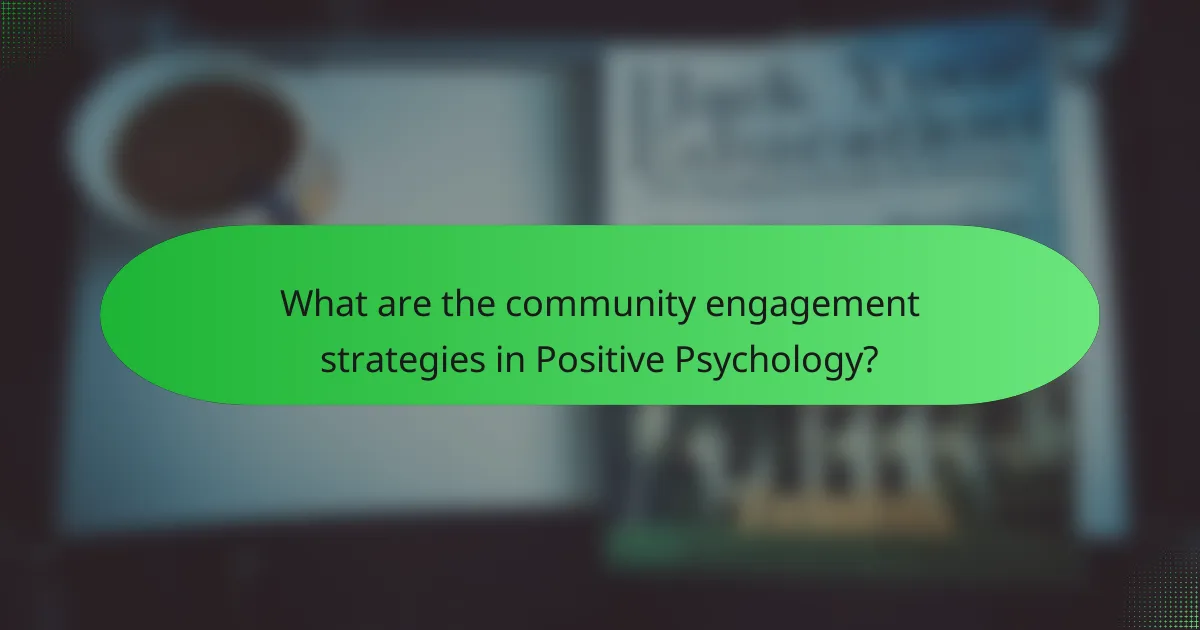
What are the community engagement strategies in Positive Psychology?
Community engagement strategies in Positive Psychology focus on enhancing well-being through collective efforts. These strategies include fostering social connections, promoting volunteerism, and encouraging shared goals.
1. Building social networks enhances support systems and resilience.
2. Organizing community service initiatives promotes altruism and purpose.
3. Facilitating workshops on positive practices cultivates skills for well-being.
4. Encouraging local collaborations strengthens community bonds and resources.
How can Positive Psychology foster social connections?
Positive psychology fosters social connections by promoting well-being and enhancing interpersonal relationships. It encourages individuals to cultivate positive emotions, which can lead to stronger bonds with others. By focusing on strengths and gratitude, people are more likely to engage in supportive interactions. Research indicates that positive social connections enhance emotional resilience and overall life satisfaction. These connections are essential for community engagement, as they create a network of support that benefits everyone involved.
What role do community programs play in promoting well-being?
Community programs significantly enhance well-being by fostering social connections and providing support. They create environments where individuals can engage, share experiences, and develop resilience. These programs often focus on mental health, promoting positive psychology principles such as gratitude, mindfulness, and strengths-based approaches.
Research shows that participation in community activities leads to improved mental health outcomes, increased life satisfaction, and reduced feelings of isolation. For example, programs that encourage volunteerism can enhance a sense of purpose, contributing to overall happiness.
Additionally, community initiatives often address unique needs, such as access to resources and social support, which are crucial for vulnerable populations. By tailoring activities to specific groups, these programs can effectively boost emotional well-being and promote a sense of belonging.
In summary, community programs play a vital role in promoting well-being by creating supportive networks, enhancing mental health, and addressing unique community needs.
How can organizations leverage Positive Psychology for community development?
Organizations can leverage Positive Psychology to enhance community development by fostering well-being, resilience, and social connections. This approach emphasizes strengths and positive experiences, which can lead to improved community engagement and collaboration.
Positive Psychology principles, such as gratitude, optimism, and empathy, can be integrated into community programs. For instance, initiatives that promote volunteerism can enhance social ties and individual fulfillment. Research shows that communities focusing on strengths report higher satisfaction and lower conflict levels.
Workshops and training sessions can educate community leaders on applying these principles effectively. By equipping leaders with tools to cultivate a positive environment, organizations can drive sustainable community growth.
Measuring the impact of Positive Psychology on community development is essential. Surveys assessing well-being, social cohesion, and community participation can provide valuable insights into the effectiveness of these initiatives.
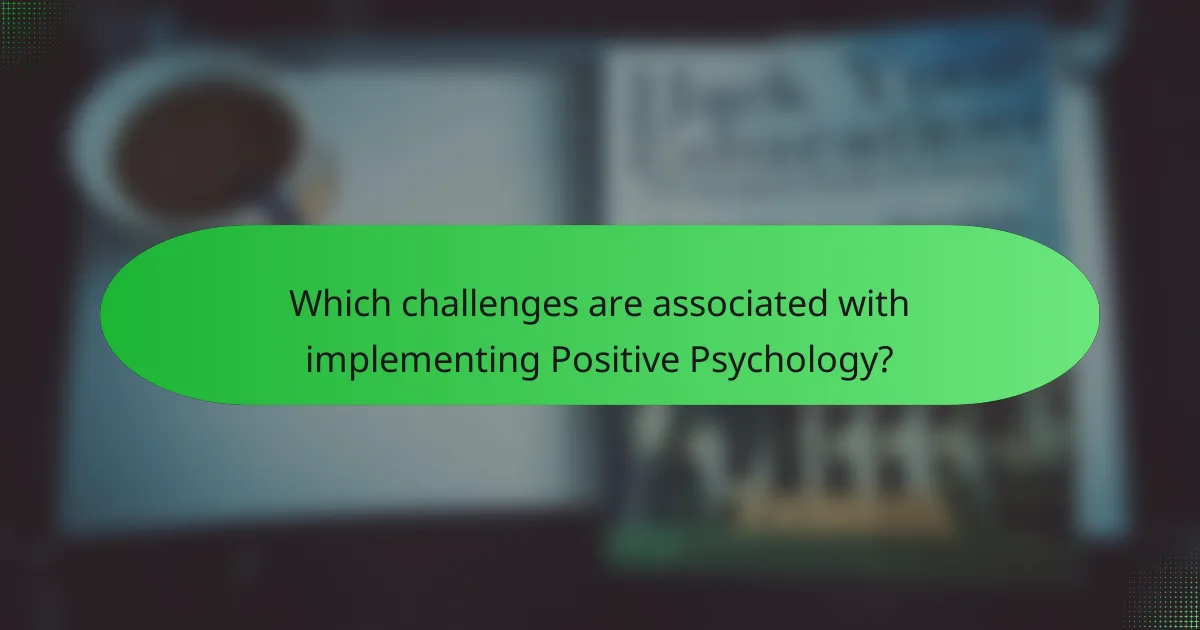
Which challenges are associated with implementing Positive Psychology?
Implementing Positive Psychology faces challenges such as resistance to change, lack of training, and measuring outcomes. These obstacles can hinder effective integration into existing systems.
Resistance to change often stems from established practices that prioritize traditional psychological methods. Lack of training can lead to misapplication of Positive Psychology principles. Measuring outcomes presents difficulties because subjective well-being is complex and varies among individuals.
Addressing these challenges requires tailored training programs, clear communication of benefits, and the development of reliable assessment tools. Engaging stakeholders throughout the process enhances acceptance and effectiveness.
What are common misconceptions about Positive Psychology?
Common misconceptions about positive psychology include the belief that it promotes constant happiness and ignores negative emotions. Positive psychology emphasizes a balanced approach, recognizing that experiencing negative emotions is essential for personal growth. Another misconception is that it is solely about individual well-being, while it also focuses on community engagement and social connections. Additionally, some think it lacks scientific backing; however, numerous studies validate its principles and applications. Finally, people often confuse it with self-help trends, but positive psychology is grounded in rigorous research and established psychological theories.
How can resistance to Positive Psychology be addressed?
Resistance to Positive Psychology can be addressed through education, community involvement, and tailored interventions. Increasing awareness of its benefits can reduce skepticism. Engaging communities fosters acceptance and application. Personalized approaches can cater to individual needs, enhancing receptiveness.
What limitations exist in current Positive Psychology research?
Current Positive Psychology research faces several limitations. These include a lack of longitudinal studies, which hinders understanding of long-term effects. Additionally, cultural biases can skew findings, as most research originates from Western populations. The field also struggles with measurement issues, as quantifying subjective well-being remains complex. Lastly, there is a tendency to overlook negative emotions, leading to an incomplete understanding of human experience.
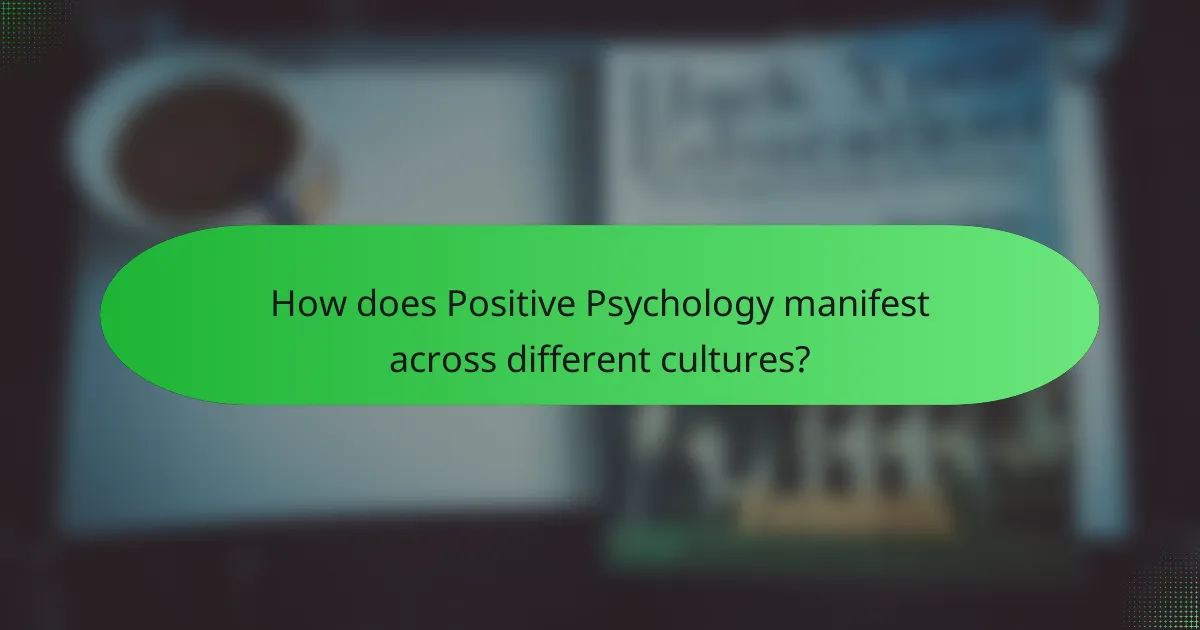
How does Positive Psychology manifest across different cultures?
Positive psychology manifests across cultures through diverse practices that enhance well-being. Each culture emphasizes unique strengths and values, influencing how positive psychology is applied.
In Western cultures, individualism promotes personal growth and self-actualization. Techniques such as gratitude journaling and mindfulness meditation are common. In contrast, collectivist cultures focus on community support and relational harmony. Practices like family gatherings and communal celebrations foster shared happiness.
Research shows that cultural context shapes the effectiveness of positive psychology interventions. For example, a study found that gratitude practices in Eastern cultures often emphasize social connections, while in Western contexts, they focus on personal achievement.
Understanding these cultural nuances enhances the application of positive psychology globally, making it more inclusive and effective across different communities.
What cultural adaptations are necessary for Positive Psychology interventions?
Cultural adaptations for Positive Psychology interventions include tailoring practices to align with local values and beliefs. Understanding cultural contexts enhances engagement and effectiveness.
Key adaptations involve language translation, culturally relevant examples, and community involvement. For instance, integrating local traditions fosters acceptance. Additionally, recognizing diverse expressions of well-being is crucial.
These adaptations ensure interventions resonate with participants, promoting sustainable positive change. Engaging local stakeholders can aid in refining approaches, making them more effective.
How do societal values influence the practice of Positive Psychology?
Societal values significantly shape the practice of Positive Psychology by influencing individual and community perceptions of well-being. These values determine what is considered a fulfilling life and guide the application of Positive Psychology principles in diverse cultural contexts.
For instance, collectivist societies may emphasize community well-being over individual happiness, affecting how Positive Psychology interventions are designed and implemented. As a result, practitioners must adapt their approaches to align with local values, ensuring relevance and effectiveness.
Furthermore, societal values impact the acceptance and integration of Positive Psychology in various settings, such as education and workplace environments. In cultures that prioritize mental health, Positive Psychology concepts may be more readily embraced, leading to broader community engagement and support.
Ultimately, understanding these societal influences is essential for practitioners to foster environments that promote positive mental health and resilience, tailoring their strategies to fit the unique cultural landscape.

What practical tips can enhance the application of Positive Psychology?
To enhance the application of Positive Psychology, focus on practical strategies that promote well-being. Incorporate daily gratitude practices to foster appreciation. Engage in regular physical activity, which boosts mood and resilience. Cultivate social connections by participating in community events. Practice mindfulness to enhance awareness and reduce stress. Set achievable goals to create a sense of purpose and accomplishment.
Which habits can individuals adopt to improve their well-being?
Individuals can adopt habits like mindfulness, gratitude, and exercise to enhance well-being. Mindfulness improves focus and reduces stress. Practicing gratitude fosters positive emotions and strengthens relationships. Regular exercise boosts mood and energy levels. These habits align with positive psychology principles, promoting overall mental and emotional health.
What are expert recommendations for integrating Positive Psychology into daily life?
Integrating Positive Psychology into daily life involves practicing gratitude, fostering positive relationships, and engaging in mindfulness. These strategies enhance well-being and resilience.
1. **Practice Gratitude**: Keep a gratitude journal to record daily positive experiences. This habit shifts focus from negativity to appreciation.
2. **Cultivate Positive Relationships**: Spend quality time with supportive friends and family. Strong social connections improve emotional health.
3. **Engage in Mindfulness**: Incorporate mindfulness practices like meditation or deep breathing. These techniques reduce stress and enhance self-awareness.
4. **Set Meaningful Goals**: Establish personal goals that align with your values. Achieving these goals contributes to a sense of purpose and fulfillment.
5. **Encourage Acts of Kindness**: Perform small acts of kindness regularly. Helping others boosts your mood and strengthens community ties.
6. **Reflect on Strengths**: Identify and utilize your personal strengths. Focusing on what you do well increases confidence and satisfaction.
What common mistakes should be avoided in Positive Psychology practices?
To avoid common mistakes in Positive Psychology practices, focus on authenticity, balance, and evidence-based approaches. Practitioners often overlook the importance of personal values, leading to superficial engagement. Neglecting to measure progress can hinder growth and effectiveness. Additionally, failing to tailor interventions to individual needs may result in ineffective outcomes. Lastly, overemphasis on positivity can lead to dismissing negative emotions, which are essential for a holistic approach.
